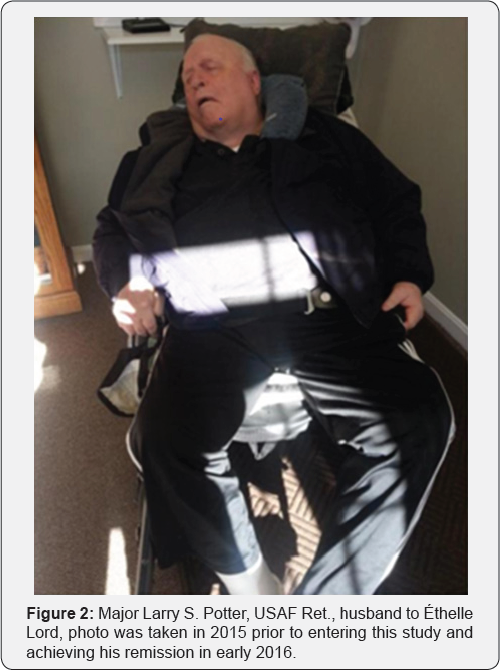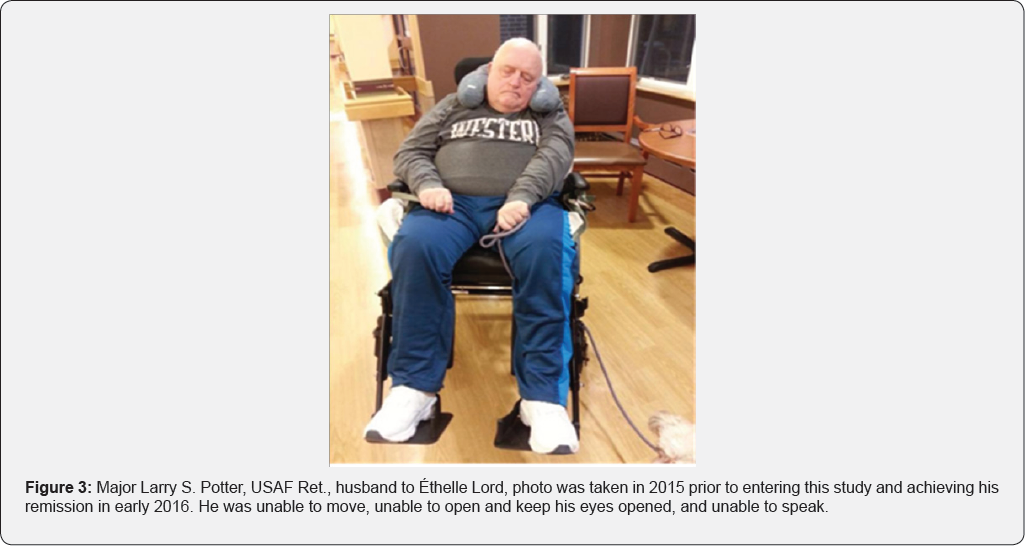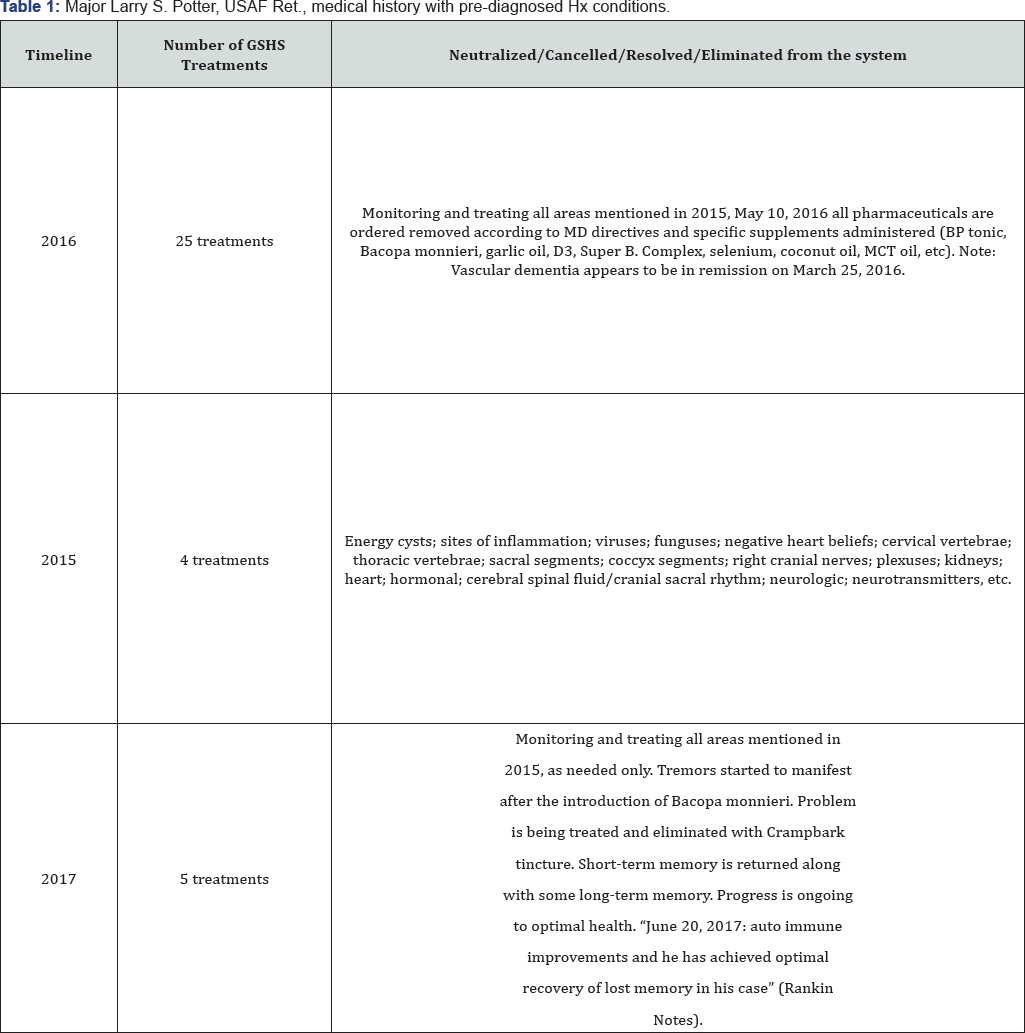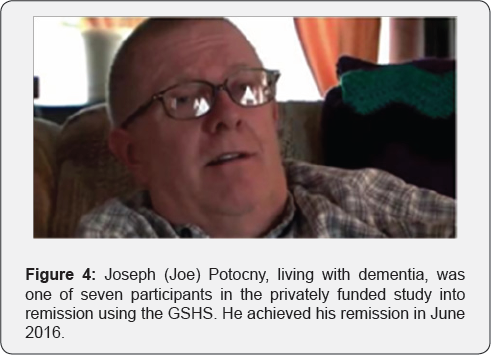Containment of Dementia Symptoms & Remission: A Case Study
Éthelle G Lord* and Richard Rankin DC
Huntington University, USA
Submission: August 09, 2017; Published: August 28, 2017
*Corresponding author: Ethelle G Lord, International Caregivers Association, USA, Tel: 207-764-1214 Email: lordethelle@gmail.com
How to cite this article: Éthelle G L, Richard Rankin DC. Containment of Dementia Symptoms & Remission: A Case Study. OAJ Gerontol & Geriatric Med. 2017; 2(2): 555585 DOI: 10.19080/OAJGGM.2017.02.555585
Abstract
It is imperative that research and discovery continues to alleviate the burden of dementia care and treatment. We present the case of a 75-year old man living with Vascular Dementia (VaD). The diagnosed was made on January 30th, 2003 by a general practitioner. As a result of the diagnosis, he immediately retired after a 15 year career as an associate business professor at a state university. Only a few years earlier, in 1999, he received a triple bypass. After GSHS treatments and herbal medicines, healing of his dementia (remission) was accomplished and all pharmaceuticals were eventually discontinued. In this case, diet, supplements and the GSHS treatments all played a critical role in containing his symptoms and eventually returning his dignity, memory, and optimal health.
Abbreviations: GSHS: Good Shepherd Healing System; VaD: Vascular Dementia; GDO: Global Dementia Observatory
Introduction
This is a case study of a 75-year old American veteran who clinically was diagnosed with Vascular Dementia (VaD) on January 30th, 2003, his 13-year history living with his dementia, and his remission of dementia. VaD is the second only to Alzheimer's representing 15% of all cases with no licensed treatments [1]. This paper is the first in a series outlining the possibility of achieving containment and remission of dementia using a newly discovered treatment known as the Good Shepherd Healing System (GSHS). This man's condition had progressed to the point of being silent, unable to respond to commands, and an unable to control his movements. His condition was profound at the time of the intervention with the Good Shepherd Healing System (GSHS), a form of energy medicine. By 2015 he had deteriorated to the point of his participating in only minimal social activities, requiring total care, being unable to open his eyes and keep them opened or focused to people and events him, and experiencing impairment of all executive skills. From 2003 to 2008 a pharmacotherapeutic approach was attempted in this case, without success [2]. Then natural supplements such as coconut oil and antioxidants were used with some with limited success.
He received Reiki and aroma therapy on a regular basis for a number of years beginning in 2010 through 2014 [3-4]. When the GSHS, along with some specific supplements was used, containment of symptoms and remission became noticeable to all care providers. The GSHS appears to hold a key to the possibility of achieving remission of dementia and a promising new therapy for millions of sufferers. Richard Rankin, DC who discovered the GSHS and Ethelle Lord, DM researched some protocols to create physical and mental improvements in patients who demonstrated cognitive, communicative and physical skills such as coordination, alertness and awareness of their environment much like this case study [5-6]. Results were promising early in the study which could be classed as remission of their dementia. Anyone can access this form of treatment either in person or from a distance. All research participants in this study received GSHS treatments for their dementia from a distance performed by Dr. Rankin, a GSHS practitioner in Arkansas, USA. This form of energy treatment for those diagnosed and livings with dementia have large financial implications for families, communities and the world. This is important research in the field of dementia care that deserves further exploration through double-blind studies. However research funds are limited and these researchers is now devoting time and money to achieving remission for one individual at a time. The GSHS appears to be a game changer.
Evidence of Remission in Dementia
The Good Shepherd Healing System™ (GSHS) may be a game-changer for Alzheimer’s and dementia. In a privately funded small study, all participants achieved remission. The GSHS is a first in its ability to STOP Alzheimer's and dementia in their tracks by offering optimal health to individuals living with either of these conditions. The World Health Organization (WHO) in 2017 is developing a Global Dementia Observatory (GDO) to facilitate countries around the world in strengthening their health systems to adequately offer support to millions living with dementia and also offer support to their families [6,7]. The estimate cost of dementia care is estimated at $604 billion annually in US dollars (see goo.gl/VqS1Yx) [8]. Dementia research is certainly important and needs to continue. Much like Jeff Bezos at Amazon.com is recognized as a game changer for his leadership, Ethelle Lord, DM, along with Richard Rankin, DC, discovered the power of remission in dementia in a small study that ended in June 2016.
Background
In the fall of 2015, I received a call from a friend in Canada who was receiving treatment at a distance working with Dr. Rankin. Her words were "I think you should talk to Dr. Rankin. He can help your husband. His work is remarkable." My husband, Major Larry S. Potter, USAF Retired, was diagnosed in 2003 with vascular dementia, and more, following his triple bypass in the fall of 1999. On the same day I picked up the phone and called Dr Rankin to discuss this matter further and perhaps even set him straight about helping with my husband's dementia. I really did not know what he would say when I dialed his number (Figure 1).

"Results of working with GSHS requires that I start to make you aware of this service for you and possibly someone you love. remain in AWE as well as the staff of where my wife is [living based on] the progress she has made in a month! She is the talk of the place."~ Gary Sinclair, mymemorymakeover.com, FACEBOOK post on February 27, 2017.
To my great surprise and awe, after a few hours on the phone I proposed a small study of individuals living with dementia. These patients were invited to participate with very little evidence of success, since no such study had ever been done. The GSHS is a new perspective on healing. Participants who volunteered to be part of this study were from different geographic areas. Their diagnoses varied from Alzheimer's and frontal lobe dementia to vascular dementia. One participant was from France, one from the Caribbean, and the others were from different parts of the United States, East to West Coasts. As serendipity has it, I wanted to discover a way to reduce my husband's symptoms of dementia. After all,in 2010 and 2014 I was able to reverse his symptoms by following recommendations in Awakening from Alzheimer's by S. Sarlin and adding coconut oil. However, each time the reversals did not hold.
Remission of Vascular Dementia: A Case Study
Larry had been diagnosed with vascular dementia on January 30th, 2003. His father, Buck Potter, one of 12 children born in Brainerd, Minnesota, also lived with vascular dementia [9,10]. When researching a genetic cause for Larry’s dementia, it was discovered that 8 of 12 children in Buck Potter’s family had been diagnosed with dementia. After moving Larry from one care facility to another in August of 2014, only a short 12-mile trip by ambulance, he closed his eyes and stopped moving for almost years [11-13]. He was very much like a person in a coma: little to no eye movement, no clear speech except for moaning and the occasional yelp, and needing total care in his new facility. His neurological impairment was extreme in 2014 (see the list of pre-remission symptoms below the photos) (Table 1), (Figures 2 & 3).



Symptoms prior to remission:
a. Had to be primed to drink and eat
b. Inability to open his eyes and focus
c. Inability to sit comfortably or hold a sitting position in his wheelchair
d. Inability to speak (only moans and yelps)
e. Inability to feed himself or hold a drink
f. Inability to participate in any activity
g. Total care and in a sleeping position 24/7 whether in or out of bed
What Dr. Rankin was telling me on the phone on that late fall evening was nothing short of amazing. I gave him my complete attention and paid him to do the very first GSHS application on my husband that same evening. This was all done from Arkansas where Dr. Rankin lives and works. My husband, Larry, was in Maine, over 1,600 miles away.
About the GSHS
The GSHS is a new form of intuitive healing delivered by a GSHS practitioner. It is delivered by voice command to a specific body system. For those living with dementia it is delivered to the brain and other body systems that are responsible for causing dementia (heart, lungs, kidneys, etc). The GSHS practitioner does not diagnose anyone. The person seeking GSHS applications always comes with their own medical diagnosis.
For the purpose of explaining how energy healing works, energy refers to anything that vibrates. Every vibration has a frequency, and vibrations are quantified by numbers. For example, voice and sound are two types of energy communication. When a dog whistle is used, the high-frequency sound it makes has meaning for a dog; however, humans are not able to react to the dog whistle because they do not hear it and therefore it does not have the same meaning for a human as it has for a dog. Although other research is ongoing in energy healing for dementia (e.g. at Harvard), the GSHS is the first approach to achieve remission in dementia patients [14-21].
The GSHS is designed to quickly identify the problems in the person living with Alzheimer's or dementia, eliminate and neutralize those problems, and achieve optimal health for the individual. Because we believe that it is possible to ACHIEVE REMISSION IN ALZHEIMER’S, return meaningful living to millions of individuals living with dementia, improve their cognitive and physical abilities, and enable them to experience optimal health, the GSHS is now available to those who have a desire to STOP dementia from progressing and regain as much as possible, cognitively and physically (Figure 4).

"Igot involved (in the GSHS study) because this was one that had no preconceptions of the disease. It involved the whole person. Not just the normal tau proteins and tangles... (GSHS) approached Alzheimer and dementia more as an auto immune disease, where the entire person needed to be treated. It covered the chemicals in the brain, blood, organs, emotions, physical being and the spiritual side of the individual. Well I finished my current involvement on 5/6/2016.
The conclusion is that I have a 25% improvement in my overall being. Here is what I can tell you. I have lost about 20 pounds. I am finally, after years, back to walking daily. For the first time, in how long, I actually use power tools. On Monday, I helped my daughter do something that I always enjoyed; we sanded down her oak dining table to get it ready to refinish it... I have more energy and do think a little clear[er], but still get confused and have problems getting things from my head to mouth... My writing is easier. The proof is in the pudding, as they say..." ~ Joe Potency, Author of LIVING WITH ALZHEIMER'S, (goo.gl/ro1vPc).
Remission for Larry Potter
Needless to say, I could barely wait to visit with Larry the day following the first application of the GSHS by Dr. Rankin. I wanted to see for myself if the GSHS application had any effect on him. To my amazement and that of his care providers, his eyes were now wide open. He was able to look all around and focus on sounds, people, and events. With tears in my eyes I said, "Larry! I've been waiting here for you for so long. Welcome back!" He was present and looking straight at me for the first time in about two years [22-24] (Figure 5).

Significance Of Remission For Larry Potter, A Case Study
Larry gained the ability to:
a) Speak full sentences
b) Move, drink without assistance, and eat finger foods
c) Ask and answer questions requiring left-brain functions
d) Participate in and enjoy activities such as outings
e) Listen to and enjoy recorded books, especially the Harry Potter series
f) Take phone calls and FACETIME or SKYPE calls
g) Attend and participate in his own care-plan meetings
After his remission, Larry has been able to keep his eyes opened during his awakened hours. He also began to speak words, form sentences, ask questions, answer questions, shake hands with others, be coordinated with his hand and arm movements in the wheelchair, and much more. Time was on his side now. "To hear his voice again with the same intonation and feelings he used to have was nothing short of a miracle to me. I continue to be amazed at his daily progress." ~ Ethelle Lord
Summary
The GSHS is a visionary healing application that is a game changer. No longer is there a mystery in what has been afflicting millions of individuals in every country around the globe. According to the World Health Organization (WHO) in a 2012 report, dementia is a public health priority (see goo.gl/jg713). The significance of remission in dementia and Alzheimer is immeasurable. There are cognitive and physical improvements we can measure. However the emotional and spiritual benefits are different for every person and their family. Remission offers families who fear their loved one is "disappearing" before their very eyes due to their dementia an opportunity to "re-appear", live a better quality of life, and experience optimal health.
The high cost of dementia care is bankrupting every nation around the world. By introducing remission the cost of dementia care is greatly reduced since independence is often returned to the person diagnosed with Alzheimer or dementia. They suddenly are able to start a finish a task without being supervised. Families are able to feel the freedom from having to suffer from watching their family member slowly loosing language and physical abilities. The GSHS is a recent discovery (2016) and therefore more study needs to be done to see that improvements continue over time. Larry continues to make progress daily and it is expected that he will walk again in the future. Various care providers and family members have expressed their amazement at the progress he had made so far. The future remains bright knowing remission has changed the course of his dementia.
References
- John T, O Brian, Alan Thomas (2015) Vascular Dementia. The Lancet 386(10004): 1698-1706.
- Tamaki Amano, Motomi Toichi (2014) Effectiveness of the On-the- Spot-EMDR Method for the Treatment of Behavioral Symptoms in Patients with Severe Dementia. Journal of EMDR Practice and Research 8(2): 50-65.
- K Wesa, B Cassileth, S Jain (2011) The Effectiveness of Biofield Therapies for Decreasing Symptoms of Pain and Anxiety, and Improving QoL. Focus on Alternative and Complementary Therapies 16(1): 1-16.
- Clive Ballard, Sarah Day, Sarah Sally Sharp et al. (2008) Neuropsychiatric Symptoms in Dementia: Importance and Treatment Considerations." International Review of Psychiatry 20(4): 396-404.
- Elizabeth Wiken Telenius, Knut Engedl and Astrid Bergland (2015) Effect of a High Intensity Exercise Program on Physical Function and Mental Health in Nursing Home Residents with Dementia: An Assessor Blinded Randomized Controlled Trial. PLoS ONE 10(5).
- Marc Worthman (2012) Dementia: Global Health Priority-Highlights from ADI and World Health Organization Report. Alzheimers Res Ther 4(5): p.40.
- The Global Dementia Observatory. WHO (2016).
- Anders Wimo, Maeleen Guerchet, Gemma-Claire Ali et al. (2017). The Worldwide Costs of Dementia 2015 and Comparisons with 2010. Alzheimers Dement 13(1): 1-7.?
- Ayesha Khan, Raj N, Kalaria and Anne Corbett (2016) Update on Vascular Dementia. J Geriatr Psychiatry Neurol 29(5): 281-301.
- Lucinda JL, Craggs, Christian Hagel, Gregor Kuhlenbaeumer, et al. (2013) Quantitative Vascular Pathology and Phenotyping Familial and Sporadic Cerebral Small Vessel Diseases. Brain Pathology 23(5): 547557.
- R Tamara Konetzka, Daniel J, Brauner, Marcelo Coca Perraillon, Rachel M, et al. (2015) The Role of Severe Dementia in Nursing Home Report Cards. Medical Care Research and Review 72(5): 562-579.
- Marike E, Boer, Cees Hertogh, Rose-Marie Droes, et al. (2007) Suffering from Dementia-The Patient's Perspective: A Review of the Literature. Int Psychogeriatr 19(6): 1021-1039.
- Malarvizhi Babu Sandilyan, Tom Dening (2014) Signs and Symptoms of Dementia. Nursing Standard 29(41): 1-13.
- Cindy Crawford, Andrew G, Sparber, Wayne B, et al. (2003) A Systematic Review of the Quality of Research on Hands-On and Distance Healing: Clinical and Laboratory Studies. Altern Ther Health Med 9(3): A96-A103.
- Chris A Roe, Charmaine Sonnex, Elizabeth C Roxburgh (2015) Two Meta-Analyses of Noncontact Healing Studies. Explore (NY) 11(1): 11
- Distance Energy Healing: http://www.myenergyworks.com/ distance_healing.html.
- Paul Drouin. "Quantum Physics: A Cure for Health Care”: https:// drpauldrouin.com/quantum-physicscure-for-healthcare.
- Deepak Chopra. "Quantum Healing / Mind Body Medicine": https:// www.youtube.com/watch?v=gLxxUtaAuCY.
- Larry Dossey (2011). 'All Tangled Up: Life in a Quantum World." The Journal of Science and Healing 7(6): 335-344.
- Jeff Levin (2011). "Energy Healers: Who They Are and What They Do." Explore 7(1): 13-26.
- Ted Christopher (2011). "The Almost Obvious Case for a Transcendental Understanding of Life." Explore 7(6): 363-368.
- R. W. Boyer (2012). "Vedic Principles of Therapy.” Explore 8(1): 26-39.
- Ivan V. Maksimovich (2016). "Improvement in Cerebral Blood Supply and Microcirculation Promotes Remission in Alzheimer's Disease.” Alzheimer's & Dementia 12(7): P782-P783.
- Sarah Shizuko Morimoto, Theodora Kanellopoulos and George S. Alexopoulos (2014). "Cognitive Impairment in Depressed Older Adults: Implications for Prognosis and Treatment.” Psychiatric Annals 44(3): 138-142.






























